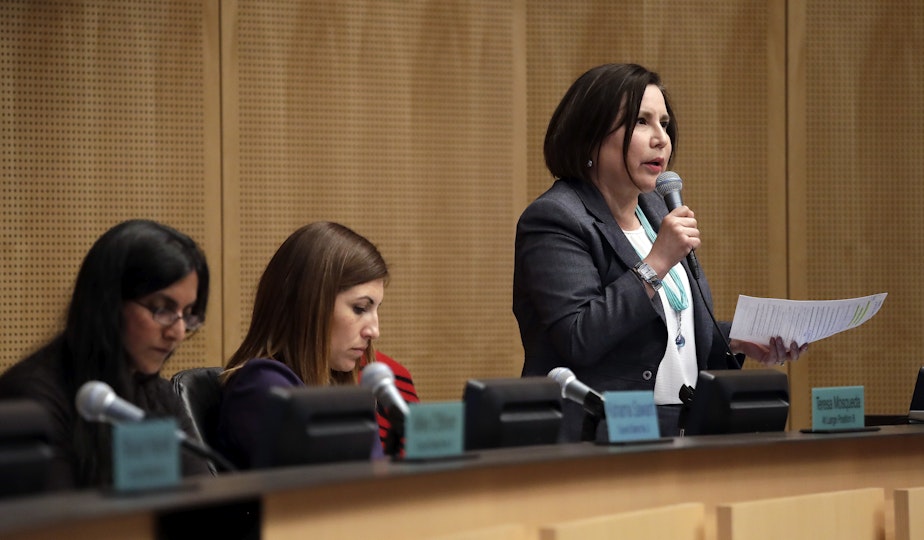Council passes 2021 Seattle budget, policing cuts included

The Seattle City Council passed the 2021 budget Monday, in an 8-1 vote. It includes new tiny house villages, and an expansion of the program that sends firefighters and social workers to people in crisis.
A central focus on the budget discussions this fall has been whether this summer’s protests calling for massive changes to police budgets and practices would affect SPD funding.
KUOW’s Amy Radil reports about the outcome.
This interview has been edited for clarity.
Take us back to the summer, when activists first called for city officials to cuts SPD funding by 50%.
Right, and a majority of Seattle City Council members agreed to that principle. Council members did try to make immediate cuts in salaries and certain police units. We saw Chief Carmen Best resign over their methods, but as discussion began on next year's budget, it became clear that Council wasn't seeking a 50% cut right away. Teresa Mosqueda chairs the Budget Committee. Here's where she says they ultimately came down:
“Regarding our Seattle Police Department, the Seattle City Council, along with the mayor's combination of both cuts, it's about 20%”
That includes both cuts, and transferring some functions outside of SPD.
Sponsored
20%, not 50%. How significant is that reduction?
If you look at other cities, it's very significant. Councilmember Mosqueda has pointed out Seattle has gone farther in this effort than any other U.S. city, except maybe Austin, Texas. A year ago, a cut like this would have been unthinkable, but people supporting what they called the solidarity budget kept the pressure up right until the end of this week.
The Council rejected their call to cut another $9 million last week, and Councilmember Kshama Sawant said that was a disappointment:
“And because of that, there has been justifiable anger and disgust at the establishment over the weekend from thousands of ordinary people who have been committed to Black Lives Matter.”
There were car caravans of activists going to city council members’ homes this weekend, and today the Council agreed to cut an additional $2 million from SPD’s budget. They say that cut should make it so there will be no net increase in police officers hired next year. They expect to hire the same number as the number of projected to leave, which is 114 officers.
Sponsored
This year, we've seen teach-ins, street protests, everything in between. It’s been a tense climate around this issue.
That's right. And the movement to abolish police, or to defund police, is a high-energy, youth-led movement. Today, Councilmember Debora Juarez said she agrees with many goals of the movement, but that she will not go at the pace that some activists have called for. She said she doesn't approve of this climate of shaming people or calling them out.:
“We're going to slowly and systematically, as much as we can, redirect funds from the Seattle Police Department to upstream programs to meet the needs of what a police department, we believe, should look like within the confines of the consent decree, our bargaining responsibilities, and everything else.”
We heard Councilmember Lisa Herbold talk about assaults that Seattle police officers had intervened in and stopped in the last couple weeks. We're seeing some council members signal support for the core functions of police, but about 130 officers have left SPD this year. Due to the hiring freeze, those officers won't be replaced.
What changes to policing will we see in the year to come?
From this budget, Seattle will be awarding at least $60 million to nonprofits, community-based organizations, over this next year to create new types of crisis response. We will see those efforts grow, and they say that the councilmembers may seek more cuts at SPD as these efforts come online.
Imani Dinish is a researcher with King County Equity Now. He envisions hubs around the city with staff who would help respond to 911 calls in their areas:
“If in the event 911 is contacted, and emergency personnel are dispatched, our team would simultaneously, or shortly thereafter, be notified of the call’s nature, and deploy in lieu of or with your general, known fire, medical, SPD."
He gives that vision of what people mean when they talk about new kinds of 911 responses. He says these workers would also be in touch with people, before and after the emergency situation, to help address underlying needs, like housing or mental health services.
Listen to the interview by clicking the play button above.





